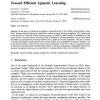Free Online Productivity Tools
i2Speak
i2Symbol
i2OCR
iTex2Img
iWeb2Print
iWeb2Shot
i2Type
iPdf2Split
iPdf2Merge
i2Bopomofo
i2Arabic
i2Style
i2Image
i2PDF
iLatex2Rtf
Sci2ools
COLT
1992
Springer
1992
Springer
Toward Efficient Agnostic Learning
In this paper we initiatean investigationof generalizationsof the ProbablyApproximatelyCorrect (PAC) learningmodelthat attemptto significantlyweakenthe target functionassumptions.The ultimategoal in this directionis informallytermed agnostic learning, in which we make virtuallyno assumptionson the target function.The namederivesfromthe fact thatas designersof learningalgorithms,we giveup the belief that Nature (as representedby the target function)has a simpleor succinctexplanation. We give a number of positive and negativeresults that providean initial outlineof the possibilitiesfor agnosticlearning. Our results includehardnessresultsfor the mostobviousgeneralizationof the PAC modelto an agnosticsetting, an efficientand generalagnosticlearningmethodbasedon dynamicprogramming,relationshipsbetweenloss functionsfor agnosticlearning,and an algorithmfor a learningproblemthat involveshiddenvariables.
Attemptto Significantlyweakenthe Target | COLT 1992 | Fact Thatas Designersof | Machine Learning | Target Function.The |
Related Content
| Added | 09 Aug 2010 |
| Updated | 09 Aug 2010 |
| Type | Conference |
| Year | 1992 |
| Where | COLT |
| Authors | Michael J. Kearns, Robert E. Schapire, Linda Sellie |
Comments (0)

